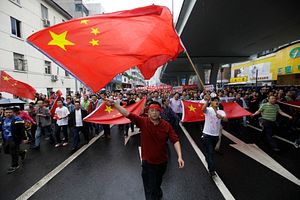Growing geopolitical tensions in East Asia, particularly between China and Japan, have increased concern that the world may be on the verge of a new crisis that could quickly and inadvertently spiral out of control. At the very least, the world looks set for a prolonged period of peacetime security competition between major powers for the first time since the Cold War.
The main driver of this security competition is China’s innovative strategy to revise the regional order in Asia. As a senior Chinese diplomat put it to me, while the United States is rebalancing to Asia, China “is trying to rebalance the status quo.” Beijing is avoiding outright aggression but is digging deep into the coercive diplomatic tools available to it to get its way. China’s seizing of the Scarborough Shoal and its declaration of an Air Defense Identification Zone in the East China Sea are two of the most prominent (and in China’s view successful) examples. If this trend continues, Japan, the United States and others will have to step up their balancing efforts and regional security competition will intensify.
The temptation when analyzing the strategic environment is to draw comparisons to America’s 20th century experiences, whether that is the Cold War or the run-up to World War I. Both are misplaced and cloud unique features of today’s challenge. Geopolitical competition is on the rise but it is occurring in a world that is highly interdependent and globalized. This distinguishes our moment – one of “interdependent competition” – from the Cold War when the United States and the Soviet Union had little to do with each other economically or culturally. Moreover, America’s allies today are closely tied to China, unlike relations between the Soviet Union and Western Europe.
At first glance, the high levels of interdependence today look similar to the pre-World War I world, but this too is misleading. Interdependence today is fundamentally different in character and scale than a century ago, for both good and ill. Supply chains are vastly more complex. Communication networks are far more sophisticated. Levels of foreign direct investment are far higher.
But do greater levels of interdependence mean that the world is less susceptible to a crisis? The short answer is no because it is wrong to assume that interdependence always serves to reduce geopolitical tensions. Sometimes, it can create vulnerabilities and exacerbate insecurities. Understanding the role of interdependence in a world where security competition between major powers is the norm is vital to properly managing risk and preserving the peace while competing responsibly.
There are good and bad types of interdependence. Trade between large states, most types of foreign direct investment and educational exchange are positive because they are hard for one side to use as a weapon against the other. They also benefit both sides. Supply chains are now so complicated that one state cannot use tariffs as a form of economic warfare without also doing damage to friendly nations and to themselves. Most foreign direct investment is hard to withdraw from where it has been placed. And educational exchange promotes mutual understanding, particularly amongst elites.
But there are also bad types of interdependence. The U.S. and China are closely linked together in the cyberworld but few, if any, would claim that this connection helps stabilize the relationship. In fact, cyber is fast becoming one of America’s greatest concerns and is a source of tension and instability. Allowing Chinese firms like Huawei and ZTE to invest in critical Western infrastructure may deepen interdependence but it would also make this situation worse. To take another example, while it is not in China’s interest to dump its holdings of U.S. Treasuries, in a crisis over its core interests it may well consider such a risky step if it believed it would hurt the American economy more than its own. From Beijing’s perspective, Chinese reliance on the U.S. navy for access to energy in the Middle East is an enormous strategic vulnerability. China worries that the United States could cut off its access to scarce resources if the two countries found themselves in a crisis.
In Southeast Asia, China’s smaller neighbors worry that dependence upon the Chinese market will leave them vulnerable to geopolitical coercion over territorial disputes or other areas of difference with Beijing. They have hedged against this risk of interdependence by deepening strategic ties with the U.S. Fortunately, Washington has been a willing partner but if its resolve were to lessen, interdependence could become a tool by which the strong coerce the weak.
Thus, although good types of interdependence will promote positive relations between the major powers, negative types will drive them apart and may create security crises that could quickly get out of control if handled badly. The strategic challenge that the U.S., China, Japan, and others have is how to maintain or even increase the positive type of interdependence while reducing the negative type.
In practice this means that the West and China ought to carefully consider whether it is in their mutual interest to continue deepening interdependence between themselves. A greater degree of autonomy in specific areas – including sovereign debt, cyber, energy, and foreign control of critical infrastructure – may serve the interests of both. For the United States, this means crafting a grand strategy that builds an international order that works best if China is a part of it but also works perfectly adequately if Beijing chooses revisionism over being a responsible stakeholder.
A calibrated approach to interdependence will not lead to protectionism. Trade ties and some forms of investment should, and most likely will, continue to increase. However, it will put interdependence and globalization on a more stable footing, capable of withstanding the security crises that seem likely to arise over the next decade.
Thomas Wright is a fellow at the Brookings Institution. This feature is adapted from a longer article in the current issue of the Washington Quarterly. Follow Wright on Twitter at @thomaswright08.

































